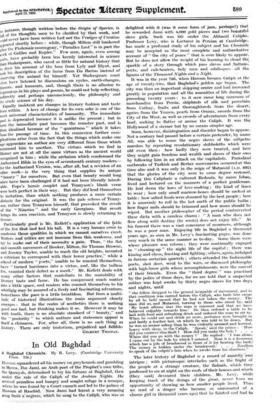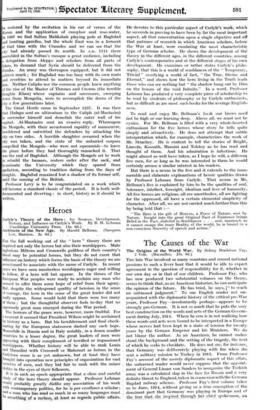In Old Baghdad , HAVING squandered all his money on
greyhounds and gambling a Mecca, Ibn Jami, an Arab poet of the Prophet's own tribe, he Quraysh, determined to try his fartune at Baghdad, then under the rule of the Caliph of the Arabian Nights. He drived penniless and hungry and sought refuge in a mosque, where he was found by a Court-eunuch and led to the palace of Hareem al Raschid. Now Jami had learnt a very amusing long froirin-neireis, which he sang to the Caliph; Who was 'so delighted with it (was it some form of jazz, perhaps?) that he rewarded Jami with 4;000 gold pieces and two beautiful slave girls. Such was life under the Abbasid Caliphs, Professor Levy, who is Lecturer in Persian at Cambridge, has made a profound study of his subject and' his Caro/fide may be accepted as the most complete and authoritative account of " the city of peace " that is ever likely to appear. But he does not allow the weight of his learning to cloud the sparkle of a story through which pass slaves and ,Syltan.s; poets, and cub-bearers, holy men and odalisques—:all the figures of the Thousand Nights and a Night.
It was in the year 786, when Haroun became Caliph at. the age of twenty-two, that Baghdad's golden age began. The city was then an important shipping centre and had increased greatly in population and all the amenities of life during the preceding twenty years : to it now came long caravans of merchandise from Persia, shiploads of silk and porcelain from Cathay, fruits and thoroughbreds from the desert, agates from the Yemen, pearls from Ormuz, swords from the City of the West, as well as crowds of adventurers from every land, seeking to flatter or amuse the Caliph. It was the Hollywood of a sterner but by no means simpler age.
Soon, however, disintegration and disorder began to appear. Not a century had passed before a certain pretender, by name Ali, was able to rouse the negro slaves of the saltpetre marshes by repeating revolutionary shibboleths which were old even then : how badly they were treated, . and how they might gain freedom and wealth and slaves of their own by following him in an attack on the capitalists. Periodical outbreaks of Turkish and Berber mercenaries occurred at this time also and it was only in the reign of Mutamid (A.D. 892) that the glories of the city were to some degree restored. During this Caliphate a cultured Bedouin, by name Ishaq, lived and lectured on the manners of a perfect gentleman. He laid down the laws of love-making ; the kind of linen to wear ; how only small marrow-bones should be sucked at table ; how salted foods were shunned by the best people ; how it is unseemly to roll in the hot earth of the public baths ; how finger nails should be trimmed and how noses should be wiped. But another philosopher of the period controverted these dicta with a careless charm : " A man who does not flow along with destiny (he wrote) does not enjoy life." At his funeral there was a vast concourse of mourners, although he was a poor man. Enjoying life in Baghdad a thousand years ago, as seen in Mr. Levy's fascinating pages, was done very much in the same manner as to-day. Some there were whose pleasure was reform : they were continually engaged in cleaning-up " the night life of the capital ; there was kissing and chess, feasting and fighting; others, again, indulged in furious sectarian quarrels ; others attended the fashionable poets, shot deer, went to the wars, or discussed philosophy with high-brow girls whose accomplishments were the marvel of their friends. Even the " third degree " was practised by the police of those days, for we are told that a suspected robber was kept awake by thirty negro slaves for two days and nights, until
" the fellow dropped to the ground incapable of movement, and in that condition was carried before the Caliph, who bade him swear by all he held sacred that he had not taken the money. The man did so, and Mutamid, turning to those who stood by, said My heart affirms that the man is innocent and that we have behaved culpably towards him.' He then ordered a table to bo laid with food and refreshing drink and ordered the man to set to. When he could eat and drink no more, perfumes were brought in and lastly a feather bed, oh which he was told to lie' down. But he was no sooner asleep than he was violently aroused and hurried, heavy with sleep, to the Caliph. ' Speak,' said the prince : How did you contrive this theft ? How did you make the hole ? . . Where did you go with the money ? ' Ho replied : ' I was alone. I came out by the hole by which I entered. Near it is a hantinam which has a pile of brushwood in front of it for heating the bath: The money is hidden under the brushwood.' . . . Needles* • to speak of the culprit's fate when he awoke from his slumbers."
The later history of Baghdad is a record of anarchy anti intrigue ; with picturesque interludes such' as the fright of the people at a strange creature, the Zabzab, which they professed to see at night on the roofs of their houses and which (they said) devoured their children. Mr. Levy, while keeping track of the doings of the great, never loses an opportunity of showing us how smaller people lived. Thus we read of a draper who became so enamoured of a chords girl (a thOusand years ago) that he fainted and had to be restored by the recitation in his ear of verses of the Koran and the application of camphor and• rosevater„
In 1087 we find Sultan Malikshah playing polo at Baghdad and hunting gazelles, but the whole East was in a ferment at that time with the Crusades and we can see that the city had already passed its zenith. In A.D. 1111 there assembled in the Sultan's mosque a great audience, including a delegation from Aleppo and scholars from all parts of Islam, to demand that Syria should be delivered from the 'ranks. An army was _thereupon equipped, but it did not achieve much ; for Baghdad was too busy with its own routs and revelries to attend to matters beyond its immediate ken. Neither Caliphs nor the common people knew anything of the rise of the Master of Thrones and Crowns (the terrible Genghiz Khan) whose captains and successors, sweeping down from Mongolia, were to accomplish the doom of the city a few generations later.
The Great Horde came in September 1257. It was then that Hulagu sent an ultimatum to the Caliph (al-Mustasim) to surrender himself and demolish the outer wall of his capital. Al-Mustasim sent an evasive reply. Whereupon the Mongols, with their accustomed rapidity of manoeuvre, bewildered and outwitted the defenders by attacking the city on two sides. A horrible slaughter occurred _when the city was taken, and the state of the unburied corpses compelled the Mongols—who were not squeamish—to leave the place before they had thoroughly ransacked it. That was the end of Baghdad. Although the Mongols set to work to rebuild the bazaars, restore order after the sack, and re-animate the University which they spared from spoliation, according to tradition dating from the days of Genghiz.. Baghdad remained but a shadow of its former self, until the coming of the British.
Professor Levy is to be congratulated on a work which will become a standard classic of the period. It is both well- documented and diverting : in short, history as it should be written.



















































 Previous page
Previous page